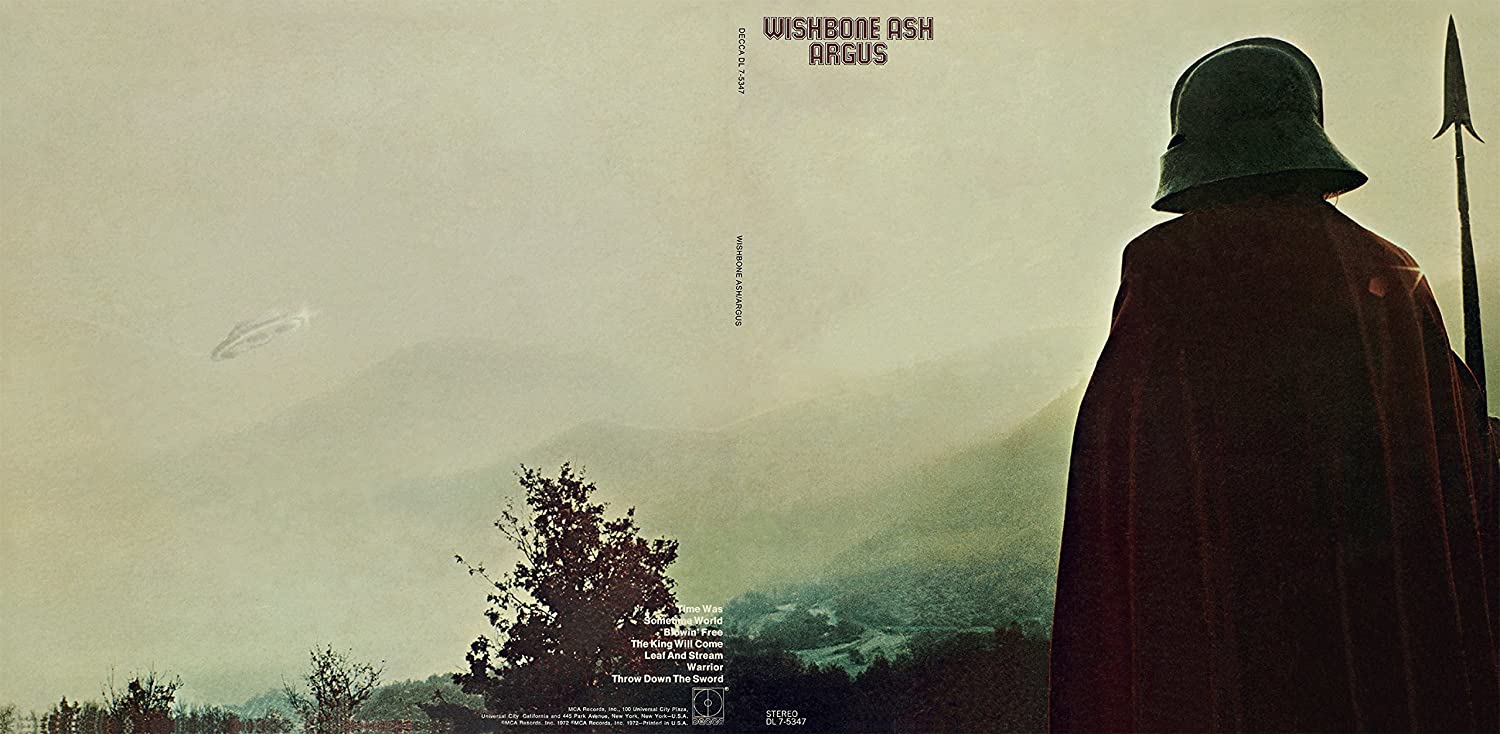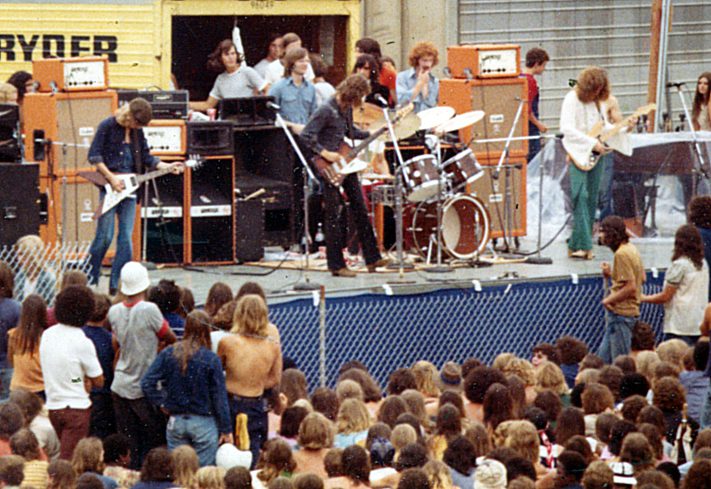50 Years after Argus, Andy Powell’s Wishbone Ash Is Blowin’ Free into RME
The Redstone Room/River Music Experience
129 Main Street, Davenport
Tuesday, March 8th
Doors 7/Show 7:30
$20 General Admission/$50 Table
All Ages
By Loren Thacher
Fifty years ago this January, trailblazing English rock band Wishbone Ash settled into London’s DeLane Lea studios to record their third record. The result was a masterpiece, an album both ahead and very much in step with its time. Argus became their best-selling album and creative high point, with the quartet perfecting their harmonized twin-lead guitar sound and adding a misty, pastoral and epic folk element to their mix of jazz, blues and hard rock.
Already a respected live band in the States, the success of Argus made Wishbone Ash a popular concert draw, establishing a firm and dedicated fanbase that has turned out to see them consistently through all the stages and lineup changes of their 50-plus year career. After the disruption of a planned 50th anniversary tour in 2020, the Ash, led by remaining founder Andy Powell, are back on the road and laying down a living, breathing, rocking history lesson at the Redstone Room in Davenport on Tuesday night.

Much like the cloaked-and-helmeted medieval guard on the cover of Argus, who stands gazing impassively at a shimmering UFO in the distance, Wishbone Ash unknowingly had their eyes on the future. Harmonized lead guitars have become a staple of hard rock and heavy metal, but the Ash did it first- and they weren’t even planning on it. The group came together as a rhythm section late in 1969- bassist/vocalist Martin Turner and drummer Steve Upton. Instead of the guitarist and keyboardist sought by their initial want-ad, fate brought them a pair of axemen- non-relation Ted Turner and sole survivor Andy Powell- and indecision kept them there.
Harmonized leads were first used in rock by the Allman Brothers Band, but Duane Allman and Dickey Betts had a goal- they were trying to play jazz a rock setting, consciously imitating the interplay between Miles Davis and John Coltrane (as well as Coltrane and pianist McCoy Tyner). Wishbone Ash had no such grand concept- they simply couldn’t decide which guitarist to keep, and in the spirit of experimentation, kept both.
Early Ash was meat-and-potatoes heavy rock, easily distinct from the cosmic-American gumbo of the Allman Brothers. The band tossed in the same blues and jazz ingredients but tempered them with a melodic sensibility largely derived from English folk. All three non-drumming members chipped in on vocals, with layered harmonies that sounded nothing like the take-it-easy California vocal sound later employed by the Eagles and company. The distinct Wishbone Ash vocal sound was much jazzier, even scatting at times, bringing to mind such counter-intuitive comparisons as Burt Bacharach.
Novel and innovative as it was, it was their guitar sound that was to leave the heaviest mark on rock and roll. The Allmans were trying to imitate the interplay and counterpoint of the ’50s and ’60s jazz masters, but Wishbone Ash essentially boiled their guitars down to a single voice, applying simple theory and harmonic spacing to a straight-ahead hard rock setting, soaring and singing above the raucous clatter of the band. Never had two guitars been made to work together in a single recognizable voice.
Other bands took note. Thin Lizzy’s Phil Lynott was a man who always kept himself attuned to new trends in music and fashion. After the initial Lizzy power trio fell apart, the popular story has it that he swore never again to be left without a guitarist, and so devised a four-piece lineup as an insurance policy. Original guitarist Eric Bell claims Lynott took him to a Wishbone Ash concert after Argus had become a hit and was “mesmerized,” though Bell was less than impressed. Bell’s replacement Scott Gorham (½ of the classic Lizzy guitar team with Brian Robertson) told Andy Powell that Lynott latched onto the harmonized-guitar sound after the new Lizzy lineup took in an Ash show a year or two later, if a Classic Rock interview is to be believed. No matter the origin, Thin Lizzy went on to become the most famous practitioners of the harmonized-lead guitar sound, which also enraptured Judas Priest, UFO, Scorpions, Accept, and many of the early heavy metal bands, becoming a staple of the popular conception of the ’80s metal sound.
Even Iron Maiden’s Steve Harris “became a bit of a fan boy” after meeting Martin Turner in 2016, decades after the fame of his own band eclipsed that of Wishbone, telling LouderSound that “not just . . . the twin guitars, but also the melodies and the vocals and Martin Turner’s bass playing” were crucial influences on that most melodic of metal bands.

Wishbone Ash were early adopters of other trends as well. Though now ubiquitous in rock music, the iconic Gibson Flying V was a rare sight in rock in 1970. Initially unsuccessful on its original 1959 production run, it was favored almost exclusively by bluesmen Albert King and Lonnie Mack. With the exception of the Kinks’ Dave Davies (who didn’t stick with it) and Jimi Hendrix (who had other axes to choose from), no one in the rock world cared about the retro-futuristic instrument when Andy Powell picked one up by chance in 1969 or 1970. It’s since become iconic thanks to some of the same guitarists who took interest in the Ash themselves, though no one has stepped forward to give Powell the honor of starting the trend.
Additionally, the group were one of the first bands to record and tour with Orange Amplifiers, the boutique guitar and bass amps as well known for their bright orange covering as for their distinctive clear tube tone. After Wishbone Ash were the first to tour the United States with the fruit of Clifford Cooper’s labor, and the band have kept at it long enough to see the company rise, fall from favor, and come back miraculously to life. The brand now enjoys great popularity, thanks largely to steady patronage from the far less imaginative retro-minded “stoner rock” bands who crave the amps’ crunchy midrange and classic looks.
Instruments, amps, musical and lyrical inspiration all coalesced with unusual maturity and foucs when Wishbone settled down to create Argus. The album’s first half is noticeably gentler than their prior albums, with the folk stylings surfacing first. It begins almost like a lullaby, but the electrics take flight before long, rocketing from the lush emerald earth and hitting the sky with relish. The lyrics reflect their youth (all were in their earliest twenties), reaching and keening for neglected love and a “sometime world” rapidly passing them by as they plied their trade on endless tours. While obviously deeply personal, their words still maintain an immediate relatability and universality, balanced with just the right amount of mystique.
But it’s on side two when the band truly hits their stride, reaching heights of Arthurian majesty unparallelled before or since. “The King Will Come” fades in slowly as if emerging from the mist-shrouded past itself, kicking off a full side of tales of battle and legend, the full flowering of the band’s dive into the music and folklore of their home island. It rings with a sad yet triumphant grandeur that was never repeated, yet is still worn as a badge of honor by all involved. Songs from the album still dominate recent setlists, and the band performed the album in its entirety at a show in Des Plaines, Illinois last week.
The magic was not to last. Though the group that made Argus has reunited more than once, in 2022, Andy Powell is the last man standing. His tenacity is no surprise- he is, after all, the man who had the sheer audacity to strike up a soundcheck jam with Ritchie Blackmore when he and his band were virtually unknown. The year was 1970, and while Deep Purple had yet to reach the international stardom wrought by Machine Head and its radio hits, their Mk. II lineup was just hitting their screaming stride. The band was highly respected, and in the case of Blackmore, feared. In his heyday, Ritchie Blackmore played with the fire and fury of Hendrix at his most intense, and had a personality to match- the temper of Gordon Ramsay, the capriciousness of an irritable housecat, and the dictatorial tendencies of Captain Bligh. Most former bandmates refuse to have anything to do with the man, for good reason. Watch the video of the flaming destructive orgy that closed Purple’s set at the 1974 California Jam and you”ll understand why he earned the sobriquet “Noodles McPsychopath” from a knowing guitar tech,.
Soundcheck is a touchy time for any musician, but to step on stage, guitar in hand, with the intention of jamming with such a notorious character was akin to strolling into the Five Points in 1862 and demanding a one-on-one match with Bill “The Butcher” Cutting. Somehow the 20-year-old Powell survived, matching Blackmore lick for lick and note-for-note. Blackmore made no acknowledgment beyond the brief jam, leaving the stage in a terrifying silence. Instead of waiting behind the amps to flay Powell alive with his own Flying V, Blackmore made a call to Purple’s manager, ultimately leading the band to a record deal that stood for the next decade.

Wishbone Ash could have disintegrated without ever recording a note and this story would still be told in the halls of rock legend. At a time when many a B-and-C-list classic rock band is hitting the nostalgia circuit with one, even zero original members, this alone should answer the question of why anyone should care enough to go see yet another aged band without most of its original members. Andy Powell is a fearless pioneer, a man worthy of his craft, and one well worth seeing; and with his defining work turning 50 this spring, he’ll be pushing some rarified air from his Orange speaker cabs.
Acts who would have headlined the Adler Theatre 40 and 50 years ago have long found a welcome home down the street at RME and the Redstone Room as they near their dotage. The appreciative and energetic crowd who packed the room for Pat Travers last fall was a marked contrast to the well-dressed drunk I witnessed last summer, who, while stumbling towards the Adler’s bar during an expertly and tastefully curated Gordon Lightfoot set, grumbled to no one: “I don’t know any of these songs!”
With no disrespect intended to the Adler and its frequently top-caliber musical guests, RME is the place for artists like Travers, Savoy Brown, and the Ash; an intimate setting for bands who’ve long since passed their commercial heyday, but still maintain a dedicated coterie of fans who remember the old days, who still play the records, and turn out with regularity whenever such bands make their stops along the river. It is a tremendous boon that those within driving distance of the Quad Cities can witness pieces of rock history up close, with fellow die-hards, and, in the case of Tuesday’s show, for a rock-bottom price of $20 plus fees. Catch them if you can.
Loren Thacher is a freelance writer based in Northwest Illinois. His radio show Freewheelin’ airs every Tuesday and Friday night at 10 on WQUD (Vintage Radio, 107.7 FM), the only QC-area radio station to keep the music of Wishbone Ash in rotation since its inception. Correspondence can be sent to Lthacher13@gmail.com.









